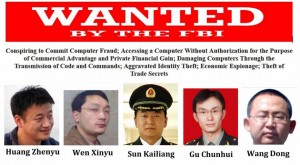State Department Yields on PC’s From China (New York Times, 2006)
. . . . .Lenovo is partly owned by the Chinese government, which holds 27 percent. “This is a company owned and beholden to agencies of the People’s Republic of China,” Mr. Wortzel said. “Our assumption is that if the Chinese intelligence agencies could take action, they would take action.”
After meetings with American government and securities agencies, including classified briefings, Mr. Wortzel and Mr. Wessel concluded that it would be possible for the Chinese government to put clandestine hardware or software on personal computers that might be able to tap into American intelligence. . . . .
Chinese PCs banned from classified US networks (New Scientist/AFP, 2006)
The US State Department has reversed its decision to install computers made by Chinese company Lenovo on within its classified networks, amid concerns over the possibility of espionage.
The State Department’s intention to use Lenovo desktop PCs was revealed in March 2006, 10 months after the company completed its $1.75-billion acquisition of IBM’s PC division.
The department bought 16,000 Lenovo computers and planned to install about 900 of them on secure networks around the world. This is according to documents released by Republican lawmaker Frank Wolf, who serves on a committee responsible for funding the department.
But after angry objections from the US-China Economic and Security Review Commission – a panel of experts appointed by Congress – the department has opted to pull the computers from these networks.
“This decision would have had dire consequences for our national security, potentially jeopardizing our investment in a secure IT infrastructure,” says Wolf. “It is no secret that the US is a principal target of Chinese intelligence services,” he said. . . . .
. . . . . The State Department’s reversal came on the same day that China denied allegations that it had tried to steal military and scientific intelligence from the US.
A Taiwanese man, Ko-Suen Moo, who worked as a sales representative for Lockheed Martin, has pleaded guilty in the US to spying for Beijing. He is accused of seeking to illegally export missiles and aircraft parts to China.
The Approaching Chinese Cyber Storm (Global Politician)
On numerous occasions in the past, China’s authoritarian regime has publicly stated that the U.S. is its ideological enemy. Comments made by Chinese defector Chen Yonglin to Australian authorities in June support the theory that China’s leaders view the U.S. as their main adversary. “The U.S. is considered by the Chinese Communist Party as the largest enemy, the major strategic rival. The U.S. occupies a unique place in China’s diplomacy,” noted Yonglin.
With inflammatory statements like those noted by Chen Yonglin, it is easy to understand why national security questions still resonate in Washington from the December purchase of IBM’s PC division by China’s largest computer company Lenovo. Although eventually approved by the Committee on Foreign Investments in the United States (CFIUS), critical questions concerning the ultimate use of the company’s state-of-the-art computers as they relate to state-sponsored cyber crime and hacking attacks, still remain largely unanswered.
Specifically, could Lenovo computers or other domestic computers be used by Beijing to initiate a coordinated cyber attack against the U.S. to fracture the stability of global financial markets, interrupt international communications, damage interconnected security networks and harm the overall effectiveness and rapid response capabilities of the U.S. military?
If history is any indication, the possibility of such an attack is authentic and should be given serious attention. . . . . . .
Australian defence minister off-line in China to avoid cyber spying-media (Reuters, 6 Jun 2012)
Australia’s Defence Minister Stephen Smith left his laptop and mobile phone in Hong Kong to avoid cyber espionage in mainland China where he will attend bilateral defence minister talks on Wednesday, Australian media reported. . . .
. . . . The United States has accused “Chinese actors” of being the world’s biggest perpetrators of economic espionage and U.S. security experts warn of a rising number of Internet-based attacks originating from China on U.S. corporate and government computers. . . . . The anti-espionage precautions, rare for Australian ministerial visits to other countries, were arranged by Australia’s defence department following allegations that laptops and mobile phones were compromised during previous ministerial visits to China. . . .
Chinese cyber-espionage threatens U.S. economy, DoD says (CSO Security, 24 May 2012)
Chinese hackers aiming malware at U.S. industries and government agencies threaten the nation’s economy, the Defense Department says. While not all cyber-espionage originates from China, the communist nation is where a lot of cyber-attacks start.
“Chinese actors are the world’s most active and persistent perpetrators of economic espionage,” the DoD said in its recent national security report to Congress. “Chinese attempts to collect U.S. technological and economic information will continue at a high level and will represent a growing and persistent threat to U.S. economic security.” . . .
. . . . Despite Chinese government denials, U.S. security experts say the nation’s sensitive economic information and technology remain the targets of foreign intelligence services, private sector companies, academic/research institutions and citizens of dozens of countries. “China is likely to remain an aggressive and capable collector of sensitive U.S. economic information and technologies, particularly in cyberspace,” the latest report said.
FBI fighting two-front war on growing enemy – cyber-espionage (CBS, 23 May 2012)
The FBI is bringing back memories of those World War II ads that said “Loose lips sink ships.” Officials say they’re responding to two threats: the sophisticated computer hacking skills of outside intelligence agencies and the possibility of a trusted insider giving away secrets.
The FBI has created a multi-city media campaign, targeting areas where there are government intelligence agencies or private contractors who work on classified military projects. The idea is to let the public know about the dangers of cyber-espionage.
In one case, something very rare: actual undercover video of a spy caught in his own web. The video shows a U.S. intelligence officer still wearing his Navy uniform when he showed up in a hotel room intending to sell secrets to a Chinese agent. . . . .
————————————–
Wisconsin Recall:
Wisconsin Governor Scott Walker:
“What has made America amazing has been the fact that throughout our history, throughout the more than 200 years of our history, there have been men and women of courage who stood up and decided it was more important to look out for the future of their children and their grandchildren than their own political futures.”–Wisconsin Governor Scott Walker
“. . . . . I think it was a triumph more than anything for middle class taxpayers. You see, for years, in my state, and I think arguably across the country, middle-class taxpayers have overwhelmingly paid for the expansion of government, for the expansion of big government liberal policies, and once and for all including as you mention, even a lot of private sector union households stood up and said, you know, we are taxpayers, we think this is going out of control. We think this is gotten too big. It is only fair to expect public employees like me and others in the public sector to pay something close to what our neighbors and our fellow citizens do in the private sector. And I think this was a victory for the hard-working taxpayers of our state that, hopefully, a victory for the hard-working taxpayers of America.”
——————————
Intelligence Leaks:
Congressional leaders call for halt to ‘cascade of leaks’ (CNN, 7 June 2012)
Congressional leaders agreed Thursday on the need for a full investigation of what one called a recent “cascade” of leaked classified information but differed on exactly how the inquiry should be conducted.
After meeting with Director of National Intelligence James Clapper, the top Democrats and Republicans on the intelligence committees of the House and Senate pledged a bipartisan effort to halt the leaks now and pass legislative changes to prevent future leaks.
However, the chairwoman of the Senate panel, Democrat Dianne Feinstein of California, was reluctant to immediately seek a special prosecutor to investigate the leaks involving a cyberwarfare program against Iran and other intelligence matters. The House panel chairman, Republican Rep. Mike Rogers of Michigan, made clear he believed an outside investigation was necessary.
Meanwhile, an intelligence source told CNN that Clapper wants more government employees to be subject to an enhanced lie detector test as a deterrent to leaking classified information. . . .
Administration playing dangerous game with intelligence leaks (Fox News, Op-ed by K.T. Farland)
. . . I’ve been in three presidential administrations, and frankly, leaks are par for the course. Some insiders leak to make themselves look good, others to curry favor with the press, still others because they disagree with a policy decision and want to expose its flaws. And sometimes it’s vengeance, pure and simple. . .
. . . . The Obama administration seems to have engaged in a systematic program of leaking the most highly classified information about our successful intelligence operations for its own political gain. It is difficult to come to that conclusion, but consider the following:
– The Bin Laden raid. As then-Secretary of Defense Robert Gates said at the time:
“Frankly … on Sunday, in the Situation Room, we all agreed that we would not release any operational details from the effort to take out Bin Laden. That all fell apart on Monday, the next day.” He reportedly blasted the Obama’s national security team at the White and suggested a new strategic communications plan, “to shut the f— up!”
– The Yemeni underwear bomb plot. The administration leaked operational details of the sting operation to the Associated Press before it was competed, according to House Homeland Security Committee Chairman New York Rep. Peter King.
– The cyberwar campaign against Iran’s nuclear program. Stuxnet, DuQu, Flame. These devastating computer viruses and worms had the Iranians scratching their heads – until details appeared on the front pages of the New York Times. Democratic Senator Diane Feinstein, Chairman of the Senate Intelligence Committee, warned President Obama that “disclosures of this type endanger American lives and undermine America’s national security.” . . .
Congress Warns Intel Leaks Put ‘Lives at Risk’ (ABC News, 7 June 2012)
Top Democrats and Republicans today demanded an end to leaks of classified intelligence because, they said, the leaks are putting lives at risk and jeopardizing future operations.
This afternoon, the senior Democrats on the House and Senate intelligence committees joined together with Republicans to denounce a recent flood of national security leaks about U.S. covert actions in counterterrorism and espionage, and to announce their collective effort to investigate the recurring issue of classified information being disclosed in the media.
Earlier this week, the FBI has opened a leak investigation into the disclosures in the New York Times last week that President Obama ordered the intelligence community to speed up cyber-attacks against Iran with the Stuxnet worm, according to federal law enforcement officials. In recent weeks, there have also been stories about the president’s “kill list” of al Qaeda drone targets and another about the double agent who helped the U.S. foil the latest attempted al Qaeda attack on a U.S. airline.
Rep. Dutch Ruppersberger, the top Democrat on the House Intelligence Committee, called recent leaks “one of the most serious of breaches” that he has seen in 10 years sitting on the committee.
“It puts us at risk. It puts lives at risk,” said Ruppersberger, D-Md. “It hurts us in recruiting assets that give us intelligence information that will allow us to protect our citizens, to work through issues that are so important to the whole issue of peace throughout the world and how we protect our citizens throughout the world.”
Sen. Dianne Feinstein, D-Calif., the chairwoman of the Senate Intelligence committee, echoed those concerns, warning that “leaks jeopardize American lives,” and have an adverse impact on intelligence employees in the field. . . .
White House leaks meet growing outrage (Politico, 7 June 2012)
The protests in Congress over national security leaks are growing louder.
“I don’t think you have to be Sherlock Holmes to figure out what is going on here. You’ve had three leaks of intelligence that paint the president as a strong leader,” Sen. Lindsey Graham (R-S.C.), a member of the Armed Services Committee, told Greta Van Susteren on Fox News on Wednesday night.
“I don’t think it’s an accident that you have three stories within about 45 days that paint the Obama administration as being effective in the war on terror at our national security detriment,” Graham added. . .
. . . Despite Carney’s strong pushback on the allegations that the leaks were politically motivated, there is nevertheless a sense on Capitol Hill that the details of classified information found in some of the stories in question –- including play-by-plays of how certain decisions were made or exact quotes from conversations that took place among the administration’s highest officials –- could only have come from those who have the president’s ear.
Rep. Peter King (R-N.Y.), who has accused the White House for cooperating too closely with filmmakers on a movie about the mission to kill Osama bin Laden, called the recent leaks were “unprecedented” in an interview with POLITICO Thursday.
“I’ve never seen such a cascading of leaks. Either Intentionally or inadvertently, there’s always going to be the occasional leak, the one sentence leak, but I’ve never seen such detail coming out while a program, if it exists, is ongoing,” he said. “Direct quotes from people and the details from the New York Times story … all of this type of thing is to me unprecedented.” . . . .
5 leaks that have Congress steamed
Lawmakers declare war on intelligence leaks
Congress criticizes intelligence leaks
Barack Obama facing calls for investigation into intelligence leaks
Bipartisan congressional group calls for legislative action on leaks
White House leaks draw ire of lawmakers’ group
Dianne Feinstein vents ire over ‘avalanche of leaks’
Leaks of spy secrets endanger US lives, congressional leaders say
Outrage over Obama administration leaks grows in Congress
Loose lips and the Obama national security ship (CNN, 1 June 2012)
The level of detail spilling out through media reports about crucial national security operations is raising the question of whether President Barack Obama’s administration can keep a secret – or in some cases even wants to.
In just the past week, two tell-all articles about Obama’s leadership as commander-in-chief have been published, dripping with insider details about his sleeves-rolled-up involvement in choosing terrorist targets for drone strikes and revelations about his amped-up cyber war on Iran.
Each article notes the reporters spoke to “current and former” American officials and presidential advisers, as well as sources from other countries. “This is unbelievable … absolutely stunning,” a former senior intelligence official said about the level of detail contained in the cyberattack story. . . .
Obama spokesman: ‘No’ to independent probe of national security leaks (ABC News, 7 June 2012)
President Barack Obama opposes the appointment of a special counsel to investigate whether vital national security secrets were improperly disclosed in a wave of news reports detailing sensitive operations, the White House said Thursday. . . .
“Public business must always be done by somebody or other. If wise men decline it others will not. If honest men refuse it, others will not.” — US President John Adams
Congressional Intelligence Committees Press Release, Wednesday, June 6, 2012:
Feinstein, Chambliss, Rogers, Ruppersberger Deplore Leaks of Classified National Security Information
In recent weeks, we have become increasingly concerned at the continued leaks regarding sensitive intelligence programs and activities, including specific details of sources and methods. The accelerating pace of such disclosures, the sensitivity of the matters in question, and the harm caused to our national security interests is alarming and unacceptable
These disclosures have seriously interfered with ongoing intelligence programs and have put at jeopardy our intelligence capability to act in the future. Each disclosure puts American lives at risk, makes it more difficult to recruit assets, strains the trust of our partners, and threatens imminent and irreparable damage to our national security in the face of urgent and rapidly adapting threats worldwide
As leaders of the House and Senate Intelligence Committees, we are jointly committed to act immediately to address this matter. Our Committees each intend to review potential legislation to strengthen authorities and procedures with respect to access to classified information and disclosure of it, as well as to ensure that criminal and administrative measures are taken each time sensitive information is improperly disclosed.
We also intend to press for the Executive branch to take tangible and demonstrable steps to detect and deter intelligence leaks, and to fully, fairly, and impartially investigate the disclosures that have already taken place. We plan to move legislation quickly, to include possible action in this year’s intelligence authorization act
The problem of leaks of classified information is not new, and efforts in the past to address it have not worked. We believe that significant changes are needed, in legislation, in the culture of the agencies that deal with classified information, in punishing leaks, and in the level of leadership across the government to make clear that these types of disclosures will not stand
King Statement on CIA/DoD Documents on Osama bin Laden Movie Collaboration (23 May 2012
Today, Rep. Peter T. King (R-NY), Chairman of the Committee on Homeland Security, issued the following statement and sent the two attached letters in response to the release of internal CIA and Department of Defense email messages related to the planned Sony Pictures movie on the mission in which U.S. Special Operations Forces killed Osama bin Laden.
The documents were released yesterday by Judicial Watch, which obtained them, via court order, through a Freedom of Information Act lawsuit. Links to the documents are available HERE.
King said: “Filmmakers Kathryn Bigelow and Mark Boal may have set out to tell a blockbuster, election-year story about one of the most highly classified operations in American history, but through these emails they’ve ended up telling a damning story of extremely close, unprecedented, and potentially dangerous collaboration with top officials at the CIA, DoD, and the White House and a top Democratic lobbying firm.”
“After reviewing these emails, I am even more concerned about the possible exposure of classified information to these filmmakers, who as far as I know, do not possess security clearances. The email messages indicate that the filmmakers were allowed an unprecedented visit to a classified facility so secret that its name is redacted in the released email. If this facility is so secret that the name cannot even be seen by the public, then why in the world would the Obama Administration allow filmmakers to tour it? The emails also tell of these filmmakers being allowed to tour the CIA’s vaults, which is absolutely shocking to those of us who know the sensitive nature of materials kept there. . .
King Calls for Investigation of Reports of Obama Administration-Sanctioned Film on Classified bin Laden Mission (August 2011)
. . . . Special Operations Command’s Admiral Eric Olson stated that the May 1st raid “was successful because nobody talked about it before, and if we want to preserve this capability nobody better talk about it after,” and that his operators’ “15 minutes of fame lasted about 14 minutes too long. They want to get back in the shadows.”
Joint Chiefs of Staff Chairman Admiral Michael Mullen stated that “It is time to stop talking,” as “We have gotten to a point where we are close to jeopardizing the precision capability that we have, and we can’t afford to do that. This fight isn’t over.”
Former Defense Secretary Robert Gates stated that “Too many people in too many places are talking too much about this operation, and when so much detail is available it makes that both more difficult and riskier” for such missions in the future. . . .














You must be logged in to post a comment.